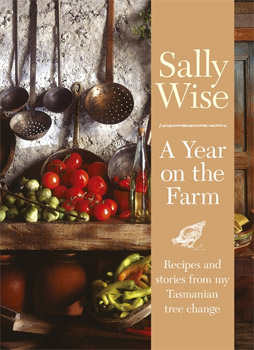A Year on the Farm

A Year on the Farm
Sally Wise, queen of the kitchen, makes a Tasmanian tree change.
For years Sally Wise, author of the best-selling cookbooks Slow Cooker and A Year in a Bottle, had dreamed of opening her own cooking school. Then one day she and her husband Robert stumbled across an idyllic property in the Derwent Valley in Tasmania. It had an orchard full of fledgling fruit trees, plenty of land to keep chickens, livestock and grow vegetables and out the back was a little chalet. A plan began to take shape.
In this charming and gently comical book Sally tells how she set up life on a Tasmanian farm where things didn't always grow as they should, where the ovens had minds of their own, where one or two stray animals soon became a menagerie, and where the bounty of the Valley inspired so many delicious meals. Here, vignettes about the realities of country life share space with over 200 recipes from Sally's home and cooking school. You'll find everything from soups to mains, jams and preserves, from home cured meats to delectable desserts.
This is paddock to plate cooking at its very best, and a lovely memoir of a tree change to boot.
Sally Wise is the bestselling author of several books including Slow Cooker, A Year in a Bottle and Sweet! and is a regular guest on ABC Local Radio in Tasmania. She is passionate about seasonal produce and creating exciting flavours from natural, readily available ingredients, and loves to share the cooking experience. She has taught children and adults of all ages and now runs the Sally Wise Cooking School at Molesworth in the Derwent Valley, Tasmania.
A Year on the Farm
HarperCollins Australia
Author: Sally Wise
ISBN: 9780733332807
RRP: $27.99
Interview with Sally Wise
Question: Can you tell us about the recipes featured in A Year on the Farm?
Sally Wise: Recipes in "A Year on the Farm" are primarily preserving recipes as I wanted the book to be a complete guide in this context. However, there are many other recipes besides for meat dishes, cakes, desserts and so on.
Question: Which one of these recipes holds the most memories?
Sally Wise: Greengage plum jam - from my childhood recollections of picking greengages from my Nan's tree and then helping her to make the jam, to more recent times, especially a particularly wonderful picnic on the cliff tops at Eaglehawk Neck, making billy tea and toast with lashings of butter and greengage jam.
Question: How would you describe the last year of your life in Tasmania's Derwent Valley?
Sally Wise: Amazing, simply amazing - especially in the sense of the abundance and quality of produce that is available here and the passionate producers who grow it.
We've had some challenges, being seaside dwellers previously (for over 15 years). We've learned a great deal about living on a farm - about raising farm animals (lambing time was interesting to say the least …), cantankerous farm equipment and we've come to meet some incredibly interesting people in the growing and sourcing of produce.
Question: How has your style of cooking and recipes changed since moving to the farm?
Sally Wise: Because of the abundance of produce here, I have been able to do a great deal more experimentation with preserving. The microclimate on this little piece of land and beyond into the greater Derwent Valley is well suited to growing more Mediterreanean style fruits and vegetables - olives, capsicums, tomatoes, cucumbers and chillies for instance. At the higher altitudes and down on the fertile river flats, exquisite berries and currants are grown in abundance, this region is a veritable preserver's paradise.
I cook a little less with fish, now we have moved from the seaside.
I now can indulge my passion for cooking with a wood-fired slow combustion stove that takes pride of place in the school. There is nothing like it for cooking the roasts of meat that come from nearby farms, as well as superb breads and pastries.
Question: Can you tell us about your cooking school?
Sally Wise: The cooking school is situated here on our 5 acre property at Molesworth (30 minutes from Hobart), in a little chalet that we have converted for the purpose. We can cater to 8 to 15 participants in classes, which are hand-on in nature, using produce we grow ourselves or access from local producers.
Preserving is probably the most popular class, but there are also classes on slow cooking, gluten free, convict and colonial era food, sweet treats, yeast goods, whole food cooking, vegetarian, sausage making and more. We even have an "As You Like it' topic, tailored to what people choose to experience by way of cooking here.
We always work with the best of seasonal produce, so readily valuable in this valley of abundance.
Question: If you were throwing a dinner party, this weekend, what three dishes would you cook for your guests from A Year on the Farm?
Sally Wise: Slow Cooked Wallaby Shanks (for those not brave enough to eat wallaby)
Colonial Lamb with Redcurrant Sauce
Morello Cherry Meringue Pie
Interview by Brooke Hunter
MORE



